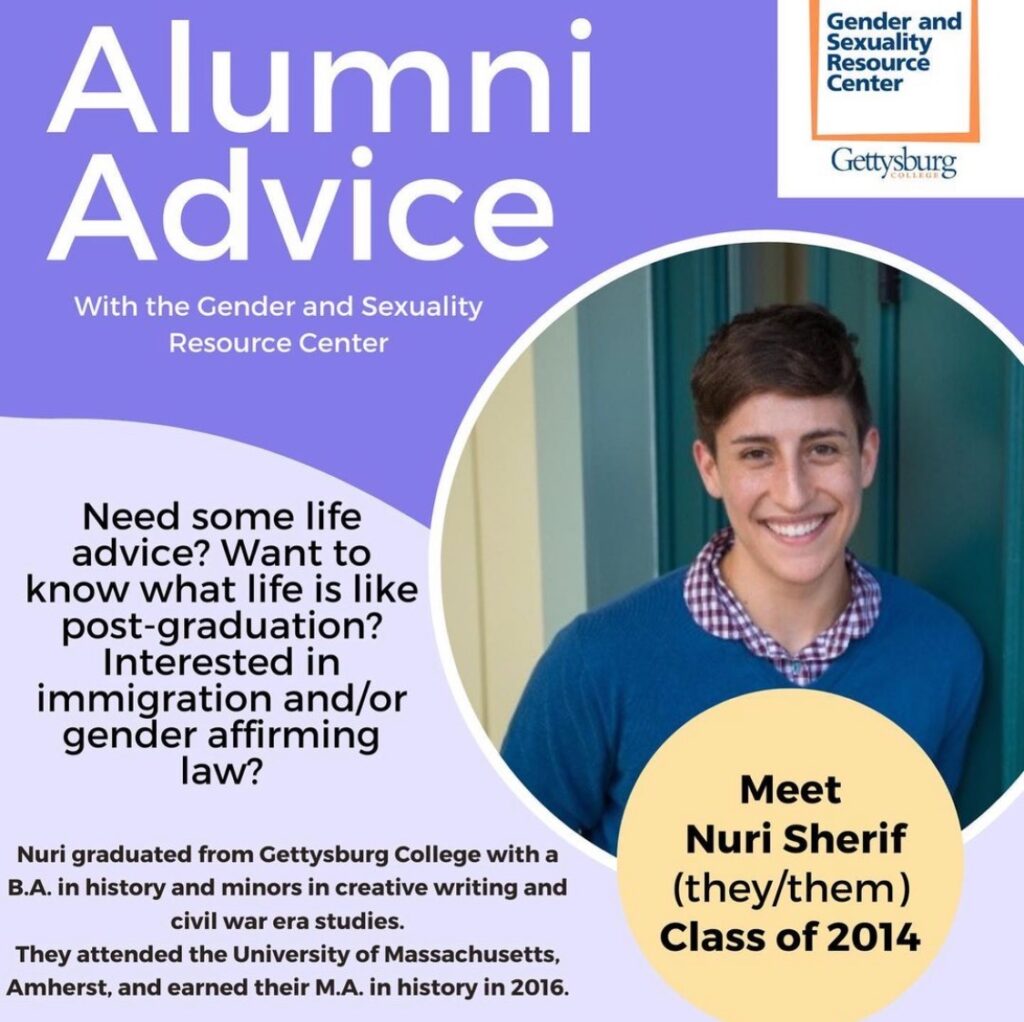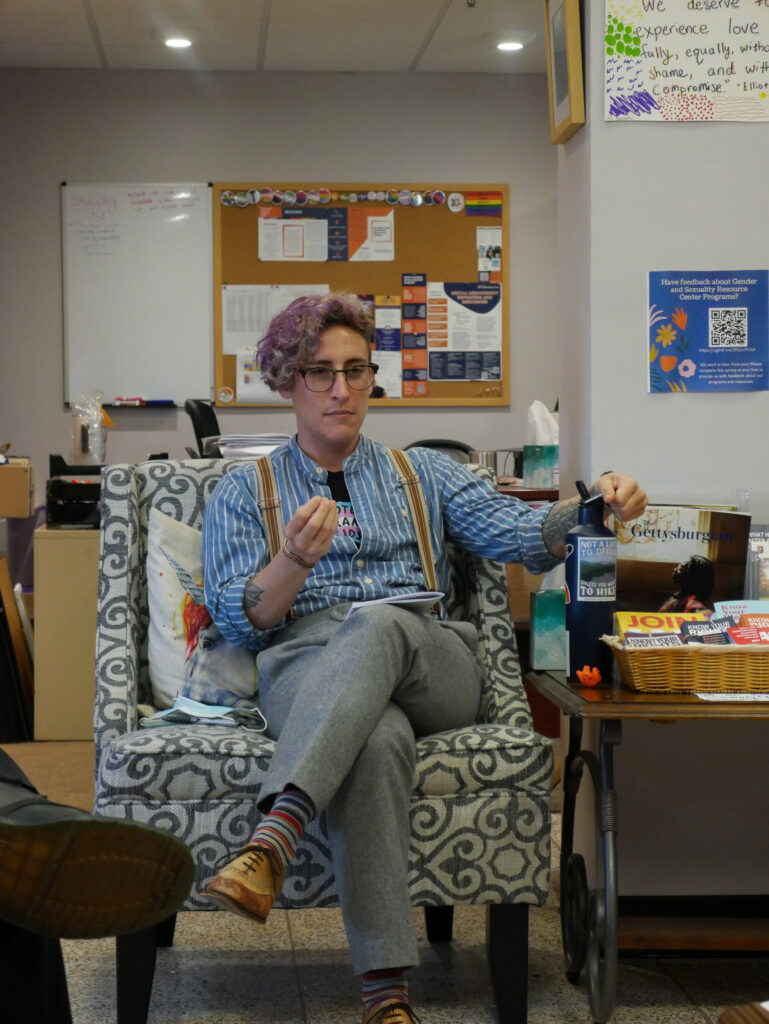Alum Nuri Sherif Shared School, Work, and Life Experiences at GSRC Talk
By Kenzie Smith, Staff Writer

Poster for the Alumni Advice Event with Nuri Sherif (Photo courtesy of the GSRC)
On Nov. 4 the Gender and Sexuality Resource Center (GSRC) hosted alum Nuri Sherif ’14, who uses they/them pronouns, to share information about their education and work experiences for an event.
Sherif introduced themself before moving on to questions. Sherif graduated from Gettysburg College in 2014 with a B.A. in history and a double minor in creative writing and civil war era studies. Sherif graduated from the University of Massachusetts, Amherst, in 2016 with a M.A. in history. They are currently working at Community Legal Aid in Springfield, Massachusetts while attending Western New England University to study law.
This path was not linear for Sherif, though. They initially stepped away from academics after graduating from the University of Massachusetts.
“I was very very burnt out, so then I did not do anything academic for a while,” Sherif said.
Sherif went from teaching horseback riding to working with immigration law as a paralegal to being a trauma support specialist to being a teen crisis intervention specialist before finally deciding to attend law school while working as a fair housing testing coordinator.
The introduction was followed by a question and answer portion.
Sherif explained how they chose their path after Gettysburg by saying it was “Kind of on the fly but also not.”
When asked asked how they chose their path after Gettysburg, they explained how they switched from public history to oral history and then finally to LGBTQ+ history in graduate school. Sherif did not realize they were not cisgender nor straight until then, when they researched gender studies and their then-partner came out as transgender.
After finishing graduate school, Sherif took a job as a paralegal because it was available. While working with immigration law, Sherif realized they wanted to help people who had survived bad circumstances. This desire caused Sherif to transition into doing service work and see the gap and underrepresentation that existed in law for trans and non-binary individuals. Sherif decided to attend law school, which is where they are now. Sherif said their research is taking them in new paths, and they may pursue a doctorate degree.
Sherif explained that money had a lot to do with how they chose which graduate school to attend. The program Sherif studied at the University of Massachusetts was fully-funded, and they had an assistantship all four semesters. Sherif encouraged those who are looking into getting their Masters degree to find a program that is funded.
Western New England University provides full scholarships to those who meet a certain LSAT score as Sherif did. Without this scholarship, they would not be attending law school. Sherif also did not want to leave Northampton.
“Since Northampton is a very queer area, I did not want to move because I knew I would have my community; it is a safe enough space,” Sherif said.
Sherif shared that the programs offered and cost were the main reasons Sherif chose to go to the University of Massachusetts. Sherif said that the university had programs they were interested in–public and oral history. Sherif explained that they do a lot of research before deciding where they want to go.
One student asked Sherif how they chose where to live.
Initially, Sherif chose to live in Northampton because of their career, but they now stay for safety and identity reasons.
Students were also curious about the changes—good or bad—Sherif had noticed at the college. Sherif said it was actually the student-driven changes that were most pronounced to them.
Sherif recalled when the College had sent out an email to alumni asking for their input in what they wanted in the president of the College when Janet Morgan Riggs retired. Sherif said they replied back asking for a president that represents the standard of diversity the College emphasizes, and in Sherif’s opinion the chosen president did not represent this diversity.
“Seeing institutions rigorously dig into their status quo and then compare that with places like this [The GSRC] that did not exist when I was here, that are student driven, that are here for visibility and here for support and here for a paradigm shift and seeing the juxtaposition between those two things has been intense and very humbling,” Sherif said.
Sherif also tackled the questions of if there is anything they know now that they wish they knew as a student at Gettysburg and if they would change anything about their college experience.
Sherif said they would not change anything on the personal level, as they were not ready at that time for any of those changes to occur. Though, they noted they would change things about the College itself.
“I think a lot of the changes that I feel would be really important would be systemic changes,” Sherif said.
Sherif said they would have liked to see a more queer-friendly environment while they attended Gettysburg was the college to be more queer-friendly.
Sherif shared the progression of their relationships that were created at Gettysburg College.
They said they still stay in touch with some of their classmates and faculty, but the relationships have changed and evolved. For instance, Sherif shared that they Zoom their senior roommate to play board games. However, some of the relationships dissipated when they realized they were transgender, as they worried about the people who may still view them as who they thought they were.
Sherif explained the struggle it was to make new friends after Gettysburg. They said it was very hard, but meeting people in graduate school helped. Sherif shared that their main ways of making friends is Tinder, the activities they’re involved with, and work.
An attendee of the event asked how graduating under a different name works with diplomas.
To have a name change on a diploma, Sherif explained, you have to get your name legally changed first. Then, you send a letter to the Registrar that includes what your name was, what you want it changed to, and an official copy of the Court Decree. To get the new diploma, you will have to pay the same price as replacing a lost diploma. If financial help is needed in this instance, the GSRC can cover the fee.
When asked what they missed most about being a student at Gettysburg, Sherif responded that it was the academia. They missed being pushed academically in a way that they are no longer pushed.
Sherif gave a piece of advice saying, “You don’t have to have it figured out at any point. I don’t even know what I’m doing next.”
Sherif concluded the event by extending recognition to LGBTQ+ members.
“I just want to thank all the LGBTQ folks for being here and existing in this space that is not designed for us,” Sherif said.
Em Eveland ’24 was grateful for this event and liked hearing from a recent alumnus.
“I thought it was really good and impactful,” they said.

